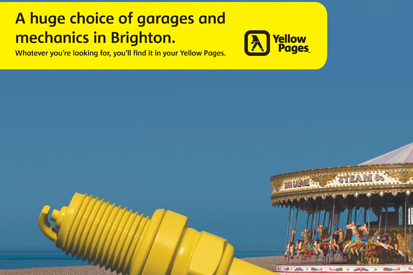Most of us have fond memories of seeing muscle men on the TV a decade or two ago attempting to rip up multiple copies of the Yellow Pages - and then giving it a go ourselves at home.
As a product, it is one that everyone knows, most people have it at home somewhere and everyone has used it.
Although its parent company Yell Group claims that 79% of UK adults still use the Yellow Pages printed directory, it is safe to say that the first port of call for sourcing a local business is now typically a quick online search.
This month, Yell Group revealed that its total revenues for the six months to 30 September were down 13.7% to £263.6m. However, this masked an even greater decline for Yellow Pages, with the directory's revenues slumping 21% to £163.2m, as internet business through Yell.com grew by 3%.
The reason for the decline is given as economic uncertainty from its core small-to-medium-sized business customers, which led to a 16.7% drop in unique advertisers in the book. With Michael Pocock, a former general manager of office networking firm Linksys, becoming chief executive in January, it is a good time to ask whether there is still a demand for Yellow Pages or it is just a legacy brand clinging on.
We asked former head of marketing at BT Directories Simon Lubin, who is now a consultant and lectures at Bucks New University, and Carl Ratcliff, executive planning director at Elvis and former planner at MCBD, which has held ad briefs for Thomson Directories.
SIMON LUBIN - Chief Executive, Simon Lubin Marketing
The growth of digital has left its mark on the printed directory and classified advertising sectors. When it comes to finding local services, the speed, accuracy and availability of online searching has marginalised Yellow Pages. Local businesses prefer spending on search engines and pay-per-click.
Yell has tapped into this with Yell.com, an excellent site, complemented by Yell's 118 247 service and Yell Mobile. These are the future. Yellow Pages is the cash generator funding future development. This necessitates careful management to prolong its life and ensure it remains cash positive for as long as possible.
It's not all gloom. Renewals and retention rates remain high, indicating strong loyalty among businesses, although it would be unwise to project this as a long-term trend. There are still big sections of society that have yet to embrace the internet and the brand heritage of Yellow Pages remains strong. Moreover, conversion rates are much higher for Yellow Pages than online search engines and pay-per-click.
REMEDY
- Ensure advertising rates are competitive locally with online costs. Make businesses aware of the higher conversion rates for print media, leading to lower cost-per-acquisition.
- Make a virtue of the Yell portfolio of brands by pushing combined print, online, 118 247 and mobile advertising/search packages to local businesses. That's something Google can't offer.
- Focus sales and marketing efforts on supporting those books in areas where there are a higher level of people who are less likely to be online.
- Reduce costs - and help the environ-ment - by stopping delivery of books to homes that no longer use them.
CARL RATCLIFF - Executive planning director, Elvis
This time last year I wanted to hire a local gardener. The lucky winner got three weeks of work and a glowing reference. I used Google. It didn't cross my mind to use any Yell services, including the Yellow Pages.
Yell blames the 9% slide in first-half revenues on the economic dip, but its problems may lie deeper. It is suffering from a lack of distinction. That might not be quite so bad if it had a strong customer relationship. Yet business owners find themselves asking where the added value really is with Yell.
Buying user-generated local review site TrustedPlaces was a smart move, but it but may be too little too late. You can't 'out-Google' Google. However, you can be more local. Supporting entrepreneurialism, for example, would help prospective small-to-medium-sized enterprises (SMEs) as well as generate greater customer loyalty.
REMEDY
- Strengthen existing marcomms: 'What we do hasn't changed in 40 years. How we do it has', seems more like a soft lament for the past than a modern, relevant sell.
- The current brandline, 'Yell and you'll find', feels like too much effort. I don't want to yell, I just want to search, quietly and effectively.
- Helping build local business confidence should form a critical cornerstone of Yell. Facilitating local business communities and consumer support feels like non-Google space that could be capitalised on.
- In the quest for 'digital', don't forget some of the familiar 'analogue' rules of business such as trust and face-to-face support. Consider becoming more of a broker between consumers and SMEs, rather than focusing too heavily on digital.



